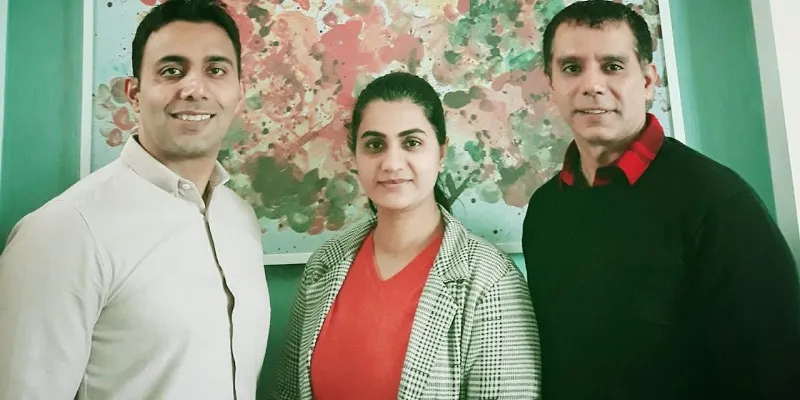How this Delhi-based startup makes construction projects easier to deliver
Founded in 2019, Delhi-based startup Tracecost’s cloud-based automated project management solution helps stakeholders to ensure faster delivery of projects.
In construction, project delays mean only two things: more interest payments and irate customers. The process of tracking projects and their various elements to make sure things don’t go off the rails would be made much easier and streamlined with the use of technology.
To facilitate project managers and contractors to take to technology and data science to manage projects, startup Tracecost was founded in 2019.
Tracecost’s project management automation solution offers significant benefits over the conventional way of working with manual processes. It aims to ensure much faster delivery of projects compared to the current average schedules in the construction industry.
Tracecost, a Delhi-based startup, is the brainchild of Prabh Paul, Madhvi Walia, and Sunny Vohra. Each of the co-founders brings with them two decades of deep exposure and expertise in the fields of project management, architecture, and construction.

Tracecost team
“Through our decades of experience in the infrastructure and construction domain, we observed that project owners around the world are increasingly demanding timely delivery of their projects from engineers and contractors. And, this demand is forcing the global infrastructure and construction industry, in turn, to re-engineer its conventional processes and embrace technology,’’ says Madhvi.
She adds that the infrastructure industry in India has not adopted automation as per global standards and still sticks with manual processes. This is the primary reason for the innumerable project delays and resultant margin and profitability pressures for infrastructure and construction companies in India.
The founders believe that their solution will prove to be indispensable for the construction industry. Among other things, it addresses workflow fragmentation, which, especially in large projects, leads to workers spending more time searching for and aggregating information than actually working.
‘’Having worked in the same industry for dozens of years, we have worked out the key reasons for the Indian real estate industry to not adopt technology in line with the global trends. The reason is because they are happy to work with excel sheets and not capture real-time in flow of data,’’ says Paul.
The team
The trio met through common friends and found a common love for entrepreneurship. That is when they began to discuss ideas of starting up a business.
Madhvi is an alumnus of IIM Lucknow. As the CEO of the startup, she is responsible for setting the company’s vision and translating it into an executable strategy that can truly transform the fast-growing construction industry in India. A certified banker, her current passion is to build a seamless link between artificial intelligence and human resources in the construction industry.
Sunny comes with experience in technology from his stints in global companies including in Canada, France, and Singapore. As the CTO, he is responsible for ideating and implementing advanced technologies that will enable Tracecost’s customers to aggregate all their financial information, understand and better manage their finances, and get access to relevant and timely information via the mobile app. Equally passionate about providing disruptive solutions for the Indian infrastructure ecosystem, he led the ramp-up of implementation processes for Alstom in Libya, Dubai, and Paris.
Paul, the COO of the startup, drives operational excellence while balancing an optimal amount of process, reporting, and structure. Paul brings extensive operations experience to the table with a global understanding of the infrastructure industry. He has closely worked with P&G, Nissan, EY, Siemens, Huawei, Bosch, Credit Suisse, Marriott, HP, Walmart, and Renault, among many other enterprises, as well as with ministries of the Indian government in their construction projects.
The goal of the startup, which is currently a 400-plus-strong design and engineering organisation, is to provide technology solutions covering all the domains of the design and construction industry.
The solution
Today, management of large construction projects involves multiple rounds of stakeholder feedback, quality control tests, and inputs from various members of the project team. In fact, communication is one of the trickiest areas for a project manager to master.
Tracecost addresses all of these areas. A cloud-based project management solution, it helps a construction project’s stakeholders, such as the engineers and contractors, get updates from the team, generate key reports, and raise triggers and alerts when problems are detected.
With the help of the Tracecost software, project owners can unobtrusively collect metadata and look at how different team members are doing their jobs. A number of predictions can be made by analysing the habits, the communication, the focus, the time spent on a task, and other attributes of the person responsible for a job.
The Tracecost app integrates specialised algorithms to help identify potentially problematic phases and improve the accuracy and integrity of stakeholder communication. It also mitigates the need for multiple and disparate software.
At present, teams use one software application to manage project tasks and resources, a second application to communicate updates and share documents, a third to track project time and expenses, and yet another to perform quality control checks. Stakeholder feedback is typically sent via emails or messages.
Teams are responsible for aggregating all these disparate pieces and considering all the stakeholder feedback to effectively move the project forward.
Tracecost combines all these tasks and processes on one single, cohesive platform that automatically resolves complex issues with simple, easy-to-use solutions. It also solves a critical problem for the infrastructure and construction industry: reducing errors by reliably offloading manual work conventionally done by a human to a machine.
The goal is to reduce the quantum of time-consuming, repetitive, and routine work, and to maximise the repeatability and predictability of results.
The business
The company works with project managers in Tier I and II cities.
‘’We are fortunate to have been well-accepted by our peers and the infrastructure fraternity. Getting sales was never a challenge in our mind; it was always about building a great product that could solve complex problems with a simple and effective solution,’’ says Madhvi.
The company, powered by a Rs 1-crore investment from its founders, has so far worked with two clients and is expanding its market. Competing with FalconBrick, a startup in the same industry, Tracecost operates on a pay-per-use model. Its current model is geared for the B2B industry, and will evolve into a B2B2C model.
Sunny explains that this vision is embedded in the core functionality of Tracecost – it helps get all project stakeholders on board. Therefore the end users, or the project owners, will also get added to the B2B model.
The market and the future
According to IBEF, the real estate sector in India is expected to reach a market size of $1 trillion by 2030 from $120 billion in 2017, and contribute to 13 percent of the country’s GDP by 2025. Retail, hospitality, and commercial real estate segments are also growing significantly to build the much-needed infrastructure for the country's growing needs.
Commercial office stock in India is expected to cross 600 million sq ft by 2018-end, while office space leasing in the top eight cities is expected to cross 100 million sq ft during 2018-20. Sectors such as IT and ITeS, retail, consulting, and ecommerce, in particular, have registered high demand for office space in recent times.
Gross office absorption in top Indian cities has increased 26 percent year-on-year to 36.4 million sq ft between January and September 2018. Coworking space across the top seven cities has increased sharply in 2018, expanding to 3.44 million sq ft by September, compared to 1.11 million sq ft for the same period in 2017.
The monies involved are big, and this startup is in the right industry, although real estate has slowed over the last five years.
“We have keenly studied some of the government of India’s marquee projects such as Digital India, Make in India, Smart Cities, and Housing for All and initiatives such as RERA that have truly benefitted from automation in the infrastructure industry. We are therefore betting big on the future economic and infrastructure growth of our country and are committed to growing together with India’s infrastructure industry,’’ says Sunny.
(Edited by Athirupa Geetha Manichandar)









